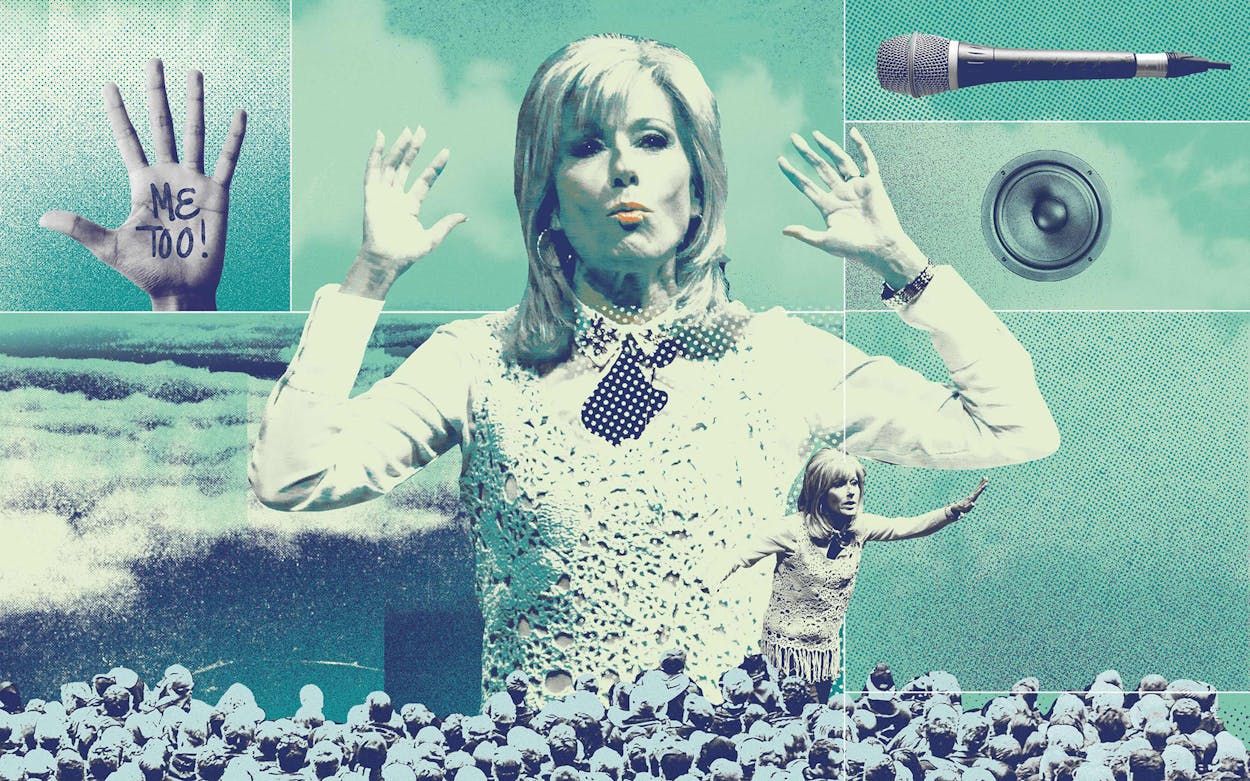On October 2016 Beth Moore read about the Access Hollywood tape of Donald Trump bragging about sexually assaulting women. She was flabbergasted. Moore, who lives on the outskirts of Houston, is a popular 61-year-old Christian evangelist who aims her ministry solely at women. She has sold millions of books, ranging from in-depth Bible studies to an inspirational work that encourages her readers to break free from their insecurities so they can live more abundant lives. At her sold-out conferences, held in arenas across the country, her fans erupt into screams when she bounces out onto the stage.
Petite and blond, Moore dresses in expensively casual outfits. She jokes about her big hair and her copious use of self-tanner. She talks self-deprecatingly about her domestic life. Then she grabs a Bible and flips through the pages with perfectly manicured fingernails. “Anybody need a fresh dose of Jesus?” she asks. Her fans scream some more as they take photos of Moore with their cellphones.
Many evangelicals do not believe women should lead churches or preach to men. Some cite the words of the Apostle Paul, who wrote in the book of Timothy, “I do not permit a woman to teach or to exercise authority over a man; rather, she is to remain quiet.” And since she began teaching a women’s Bible study at Houston’s First Baptist Church in the early eighties, Moore has carefully followed the rules and refrained from advising men about their behavior.
But after the Access Hollywood tape was released, Moore, who openly acknowledges that she was sexually abused as a child, couldn’t stay quiet. “I’m one among many women who have been sexually abused, misused, stared down, heckled, talked naughty to,” she tweeted to her hundreds of thousands of followers. “Like we liked it. We didn’t. We’re tired of it.” In another tweet, which seemed to be directed at Trump’s supporters, she wrote, “Wake up, Sleepers, to what women have dealt with all along in environments of gross entitlement & power.”
Trump’s supporters include such influential male evangelical leaders as Robert Jeffress, the pastor of Dallas’s First Baptist Church. They excused Trump’s behavior as nothing more than boorish locker room talk, and some of them asked Moore to recant. She backtracked slightly, stating that her previous tweets did not constitute an endorsement of either candidate.
But she wasn’t finished. Earlier this year, in May, as the #MeToo movement continued to sweep the country, she let loose with a long blog post that she titled “A Letter to My Brothers.” Moore wrote about how she had learned to display “constant pronounced deference” around male Christian leaders, going so far as to wear flats instead of heels “when I knew I’d be serving alongside a man of shorter stature so I wouldn’t be taller than he.” Still, she wrote, those leaders would often ignore her or make fun of her. She mentioned that one notable theologian, upon meeting her, looked her up and down and told her she was more attractive than another female Bible teacher.
She also confessed that her own acquiescence had made her complicit in perpetuating the situation. She went further still, accusing misogynistic male evangelical leaders of being driven by “sin” and “ungodliness.” Moore noted in a later post that many women who had experienced “horrific abuses” at the hands of high-ranking Christian leaders had been “silenced by fear, intimidation, shame, bullying and such manipulation of biblical submission as to border on pathological.”
It was like a bomb went off. Three days after the first letter was published, a group of Southern Baptist women called for the ouster of Paige Patterson, the president of the Southwestern Baptist Theological Seminary, in Fort Worth, noting that he had made blatantly sexist statements in his sermons (he once described a sixteen-year-old girl as “built”) and callously treated a woman who had been a victim of domestic abuse. Days later, Patterson was removed from his position by the seminary’s board of trustees.
At the Southern Baptist Convention’s annual meeting in June, delegates adopted a resolution condemning abuse and another honoring the contributions of women. One pastor even wrote a column for Christianity Today saying that he would nominate Moore as the next president of the Southern Baptist convention if he thought she would accept.
Such a thing didn’t happen, of course. But what no one can deny is that Moore has done something momentous: she has ignited the #MeToo movement among evangelical women. “The winds of change have been blowing for a while,” Moore blogged last summer. “But those winds have been upgraded to a hurricane. A holy hurricane.”
This article originally appeared in the December 2018 issue of Texas Monthly with the headline “Forcing Evangelical Christianity to Get Woke.” Subscribe today.









